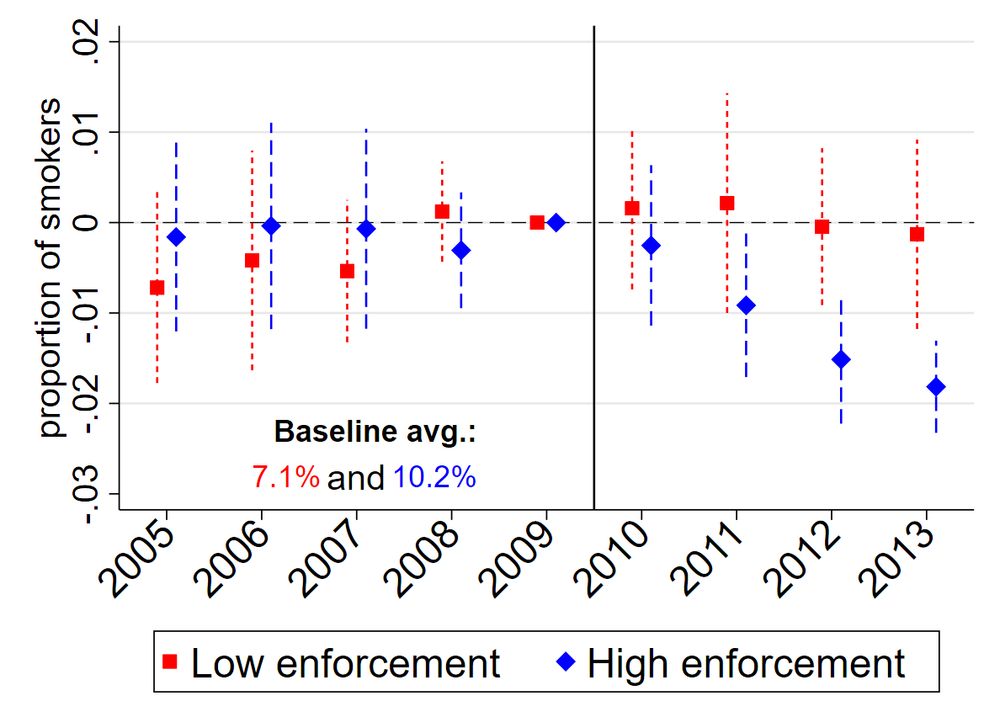
Postdoctoral Researcher at ZEW – Leibniz Centre for European Economic Research (@zew.de)
PhD in Economics @uc3meconomics.bsky.social
https://sites.google.com/site/camilastfs/home
🚭 Our findings suggest comprehensive, well-enforced bans are an effective tool in shaping smoking behavior.
🧵 8/8
#PublicHealth #TobaccoControl #Brazil #SmokeFree #Economics #Policy #Research
@zew.de @uspoficial.bsky.social @economiausp.bsky.social
🚭 Our findings suggest comprehensive, well-enforced bans are an effective tool in shaping smoking behavior.
🧵 8/8
#PublicHealth #TobaccoControl #Brazil #SmokeFree #Economics #Policy #Research
@zew.de @uspoficial.bsky.social @economiausp.bsky.social
➡️ Anti-smoking policies face unique challenges and remain underexplored in developing countries.
➡️ Many European countries still allow smoking lounges or exclude outdoor/partial spaces from bans.
🧵 7/8
➡️ Anti-smoking policies face unique challenges and remain underexplored in developing countries.
➡️ Many European countries still allow smoking lounges or exclude outdoor/partial spaces from bans.
🧵 7/8
✅ Increased quitting rates — especially among recent starters
✅ Lower initiation
➡️ We also show how to decompose prevalence outcomes and study pre-trends in these settings.
🧵 6/8

✅ Increased quitting rates — especially among recent starters
✅ Lower initiation
➡️ We also show how to decompose prevalence outcomes and study pre-trends in these settings.
🧵 6/8
Where enforcement was weak, the policy had no significant impact.
➡️A clear message for policymakers: laws on paper are not enough!
🧵 5/8

Where enforcement was weak, the policy had no significant impact.
➡️A clear message for policymakers: laws on paper are not enough!
🧵 5/8
🚭 In places with strong enforcement, the bans led to an 18% reduction in smoking prevalence among young adults within 4 years!
🧵 4/8
🚭 In places with strong enforcement, the bans led to an 18% reduction in smoking prevalence among young adults within 4 years!
🧵 4/8
➡️ No smoking lounges
➡️ Enforced compliance
🧵 3/8
➡️ No smoking lounges
➡️ Enforced compliance
🧵 3/8
📉From 18% in 2008 to 12.6% in 2019, smoking prevalence has steadily declined.
But have smoke-free policies contributed to this? We investigated. 👇
🧵 2/8
📉From 18% in 2008 to 12.6% in 2019, smoking prevalence has steadily declined.
But have smoke-free policies contributed to this? We investigated. 👇
🧵 2/8
🚭 Our findings suggest comprehensive, well-enforced bans are an effective tool in shaping smoking behavior.
🧵 8/8
#Econsky #PublicHealth #TobaccoControl #Brazil #SmokeFree #Economics #Policy #Research
@zew.de @uspoficial.bsky.social @economiausp.bsky.social
🚭 Our findings suggest comprehensive, well-enforced bans are an effective tool in shaping smoking behavior.
🧵 8/8
#Econsky #PublicHealth #TobaccoControl #Brazil #SmokeFree #Economics #Policy #Research
@zew.de @uspoficial.bsky.social @economiausp.bsky.social
✅ Increased quitting rates — especially among recent starters
✅ Lower initiation
➡️ We also show how to decompose prevalence outcomes and study pre-trends in these settings.
🧵 6/8

✅ Increased quitting rates — especially among recent starters
✅ Lower initiation
➡️ We also show how to decompose prevalence outcomes and study pre-trends in these settings.
🧵 6/8
Where enforcement was weak, the policy had no significant impact.
A clear message for policymakers: laws on paper are not enough!
🧵 5/8

Where enforcement was weak, the policy had no significant impact.
A clear message for policymakers: laws on paper are not enough!
🧵 5/8
🚭 In places with strong enforcement, the bans led to an 18% reduction in smoking prevalence among young adults within 4 years!
🧵 4/8
🚭 In places with strong enforcement, the bans led to an 18% reduction in smoking prevalence among young adults within 4 years!
🧵 4/8
➡️ No smoking lounges
➡️ Enforced compliance
🧵 3/8
➡️ No smoking lounges
➡️ Enforced compliance
🧵 3/8
📉 From 18% in 2008 to 12.6% in 2019, smoking prevalence has steadily declined.
But have smoke-free policies contributed to this? We investigated. 👇
🧵 2/8
📉 From 18% in 2008 to 12.6% in 2019, smoking prevalence has steadily declined.
But have smoke-free policies contributed to this? We investigated. 👇
🧵 2/8

